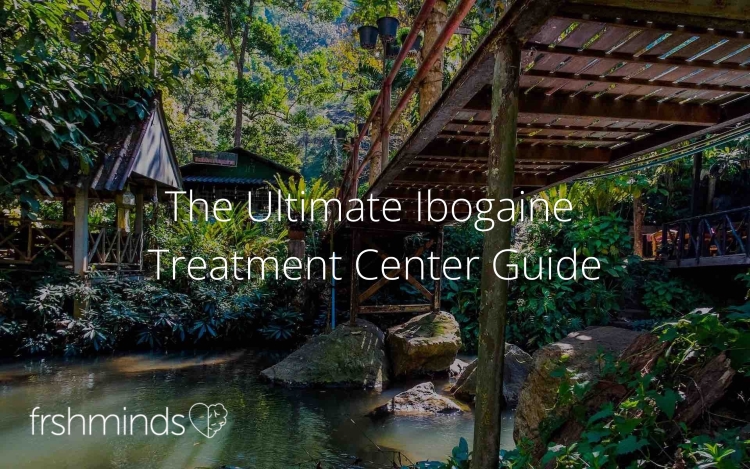
The Complete Ibogaine Retreat Guide
Table of Contents
…Everything You Need To Know!
Welcome to your comprehensive ibogaine retreat guide!
If you are curious about the mystical world of ibogaine and its role in mental wellness, you are in the right place.
By the end of this guide, you will understand ibogaine’s history and therapeutic potential, be aware of some necessary precautions, and learn about some of the world’s top providers.
How to Use Frshminds’ Ibogaine Guide
You can read Frshminds’ ibogaine retreat guide from start to finish or use the links below to hop to specific sections.
Part 1: An introduction to ibogaine retreats: A quick overview of ibogaine’s historical roots and its modern significance in addiction treatment.
Part 2: Ibogaine retreats on Frshminds: Explore curated listings of global ibogaine retreats on Frshminds as well as what you need to know before participating in one.
Part 3: Ibogaine treatment: Understand ibogaine’s role, where it comes from, and why it is on the rise.
More Frshminds Psychedelic Guides
Be sure to check out all of our guides
- The Ultimate Psilocybin Retreat Center Guide
- The Ultimate Ayahuasca Retreat Guide
- Frshminds’ Guide To Ketamine Clinics
Part 1: Ibogaine Retreats: An Overview
Ibogaine is rising as a potent solution to addiction. But it is more than just a recent discovery.
Deeply rooted in the West African Bwiti religion, the Iboga shrub has long been consumed in rituals and rites of passage.
Beyond its traditional uses, modern science is currently exploring Ibogaine for addiction treatment and psychotherapeutic potential.
Chemically, ibogaine belongs to the ‘tryptamines’. It engages with multiple brain receptors, changing perception and emotional landscapes.
In simpler terms, it messes with how your brain processes stuff, leading to profound perceptual and emotional shifts.
This can be immensely healing, but it is not without risks…
Part 2: Ibogaine retreats on Frshminds.com
Frshminds.com offers a curated list of ibogaine retreats and treatment centers from around the world.
To see our retreat listings, click here: [Link to filtered ibogaine search results pages]
Ibogaine Retreats: What You Need to Know
Before you join an ibogaine retreat, there are some things you should know.

While ibogaine can greatly help with general healing, it is most commonly used to treat substance abuse problems.
People who have exhausted other methods often turn to ibogaine as a last hope.
In fact, ibogaine retreats even seem to work better than standard substance abuse rehabilitation programs. (But seeing that most rehab programs have very low success rates, that isn’t entirely surprising.)
Ibogaine retreats stand out from other psychedelic retreats in some significant ways:
- Long programs: Ibogaine retreats usually last up to a month. The need for multiple sessions and thorough integration makes a longer stay essential.
- Strict intake: There are generally rigorous entry requirements, including comprehensive medical and psychological screenings and detoxification.
- Intensive therapy: An ibogaine retreat isn’t a weekend getaway. We are talking about intense therapy done by qualified professionals.
- Distinct experience: Unlike feeling ‘high,’ ibogaine keeps users grounded. It evokes deep healing through thoughts, insights, and images. Think less “I’m flying” and more deep soul-searching.
Part 3: Ibogaine treatment
So, what’s the deal with Ibogaine?
What makes it so effective in treating addiction? Where does it come from? And why is it gaining prominence only now?
Have a look at our ibogaine-related articles below.
What’s an Ibogaine Experience Like?
An ibogaine journey is a deep dive into the subconscious. It is intense, marked by vivid imagery, introspection, and emotional release.
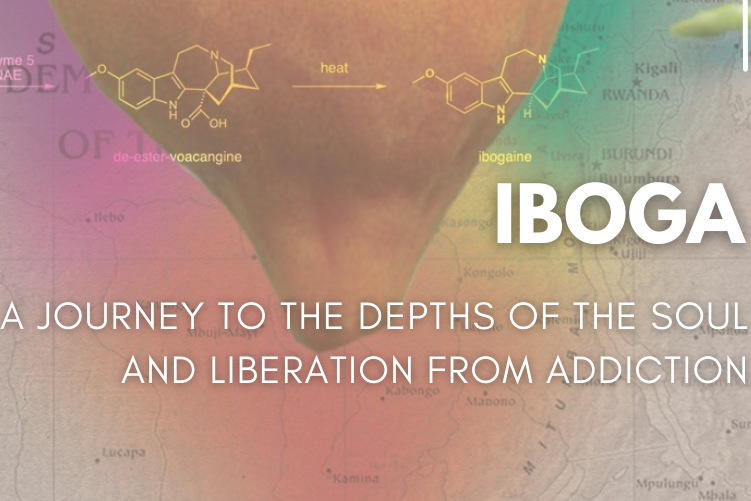
While it shares some similarities with other psychedelics, ibogaine has a unique feel.
The experience includes an acute phase of 4-8 hours with visual hallucinations and introspection. Residual effects can last weeks, featuring heightened energy or libido.
Typical physical and psychological effects include:
- Tremors, heart rate changes, and blood pressure fluctuations
- Feelings of nausea and a desire to vomit
- Physical heaviness
- Coordination issues
- Deep relaxation
- Heightened sensitivity
- Changes in perception
- Facing past traumas and repressed memories
- Emotional catharsis
- Increased connection to self and others
As with any psychedelic substance, preparation and integration are key.
Ibogaine vs. Ayahuasca – What You Need to Know
Both ayahuasca and ibogaine are plant-derived, psychoactive substances rooted in indigenous rituals.
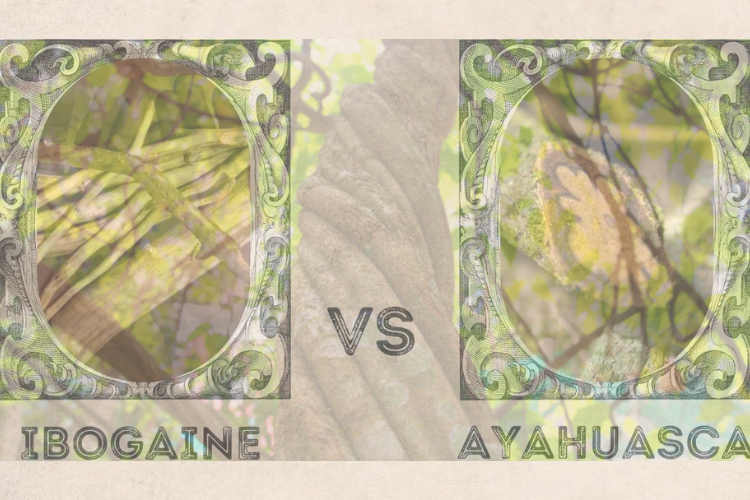
Hailing from the Amazon, ayahuasca takes you on a 4-6 hour spiritual journey, whereas ibogaine, from West Africa, immerses you in an 18-24 hour “waking dream” experience.
Neither is just for kicks; both offer intense, sometimes challenging experiences that may include purging, which is seen as a spiritual cleanse. Especially with ayahuasca, you can expect to expel fluids from different body orifices.
Safety-wise, ayahuasca has the upper hand, but if addiction is your main concern, ibogaine might be worth considering.
As with all psychedelics, your safety, intent, and desired outcomes should guide your choice.
Understanding the Iboga Ceremony
In West Africa, Iboga is more than just a root; it is believed to serve as a bridge to ancestors and the spiritual world.
An Iboga ceremony requires thorough preparation, spanning a month. This includes:
- Fasting
- Meditation
- Spending time in nature
- Setting intentions
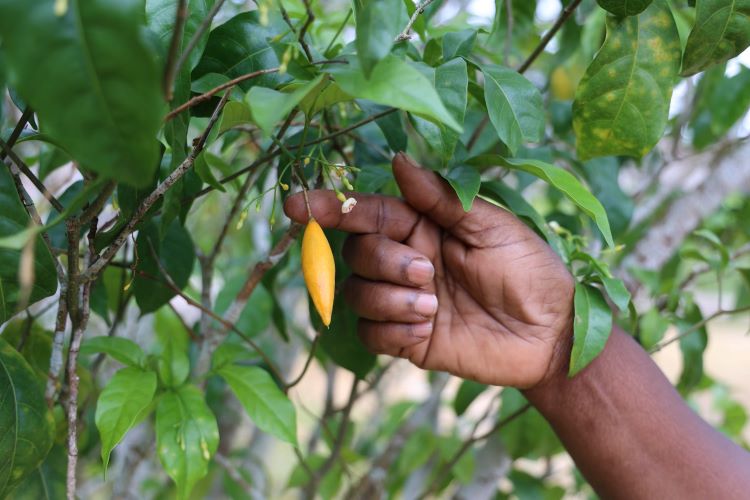
Led by a ‘Nganza’ (akin to a shaman), the ceremony combines chants, music, and rituals.
The 18-24 hour introspective journey varies; while some find enlightenment, others may feel overwhelmed by the intense effects — many experience both.
The effects typically unfold in 1-3 hours and peak during the first 4-8 hours.
Post-ceremony, you may feel a surge in energy and libido that can linger for weeks.
Not all tales are euphoric. Fatalities, often linked to unprepared users, highlight the importance of engaging with Iboga responsibly.
Ibogaine legality
In some countries, like Gabon and New Zealand, ibogaine is allowed, while in others it is completely banned. Some places don’t even have clear rules because it is not widely known yet.
Ibogaine’s legal status generally falls into one of these four buckets:
- Legal
- Unregulated (no specific rules)
- Maybe legal in certain situations
- Totally illegal
For a clear overview, check out this article where we go over ibogaine’s legal status around the world.
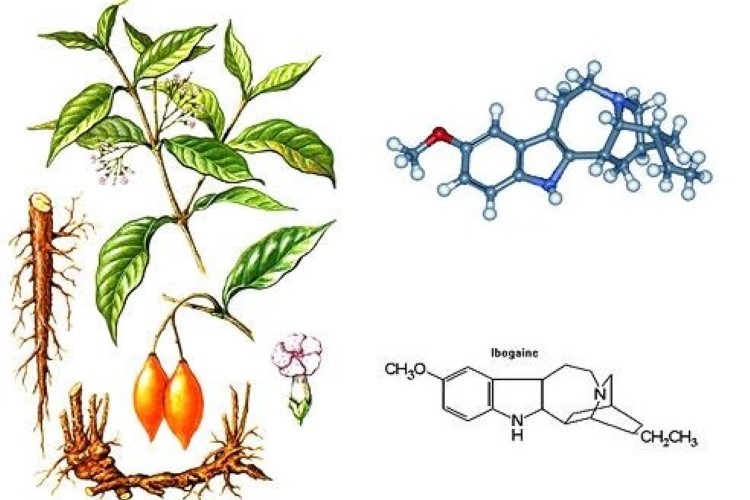

Comments